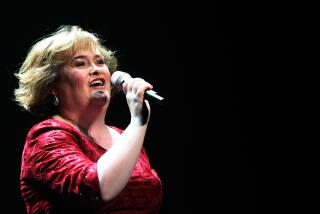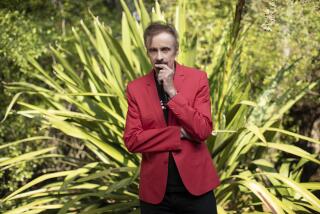Britain’s own ‘Idol’ complex
- Share via
LONDON — In the physics of entertainment, this is Boyle’s law: If Susan the human supernova is on the telly, then a gazillion viewers are sure to be trailing, comet-like, in her wake.
The truth of that axiom is set to be demonstrated this weekend as “Britain’s Got Talent,” the star-search reality show that made frowzy, frizzy-haired Susan Boyle a household name from Argentina to Zimbabwe, enters its highly anticipated semifinal phase.
Officially, it’s still a secret whether the singing Scotswoman will be among the contestants to progress to the next round of the competition; the fortunate 40 are to be announced Saturday, the day before Britain’s ITV network begins broadcasting the semifinals live over five nights next week.
But for Boyle not to make the cut would be a public-relations disaster - not to mention a colossal business blunder -- that would probably trigger a bigger popular revolt in this country than the present dust-up over politicians who claimed horse manure on the taxpayer dime.
“It’s almost impossible,” Julia Hobsbawm, head of the media analysis firm Editorial Intelligence, said of the chances Boyle would be passed over. “If popularity and the popular consciousness is anything to go by, she’s still very much in the bloodstream of opinion. That hasn’t abated.”
The show’s producers and its panel of judges, including the omnipresent Simon Cowell, are certainly aware that to vote Boyle off would be to kill their golden-egg-laying goose. Since her initial appearance on the program April 11, when she wowed the audience with her rendition of “I Dreamed a Dream” from the musical “Les Miserables,” the 47-year-old charity worker has gone on to become a global phenomenon. That has come either in spite of or because of -- depending on whom you ask -- her bushy-browed looks and self-proclaimed virginal innocence.
It’s been almost six weeks and Boyle mania has barely waned. The fires have been stoked by appearances on “Oprah” and the “Today” show, admiring comments from Demi Moore and Patti LuPone, and endless commentaries on what her fame means in jaded, irony-soaked Britain. (The triumph of substance over style? The exception that proves the rule?)
The YouTube video of that first audition has now racked up a staggering 58 million hits -- nearly as many people as live in the United Kingdom. So ubiquitous is Boyle that one of the potty-mouthed characters on “South Park” threatened to “puke” out delicate parts of his anatomy if he heard her name mentioned again.
“Oh, my God, on all the shows I’ve ever worked on, far and away” Boyle has been the biggest sensation, said Sara Lee, the program’s publicist. “I don’t think anybody in the U.K. has seen anything like this.”
As proof of Boyle’s instant fame, it wasn’t long before the British media treated her the way they do just about every homegrown celebrity: by trying to take her down a peg.
She was dismissed by one commentator as a “pretty good singer, but . . . not a great singer.” Others aloof from the general mood of adulation have said the same.
Britain’s pull-no-punches tabloids then took Boyle to task for succumbing to the temptation of a makeover, though by all accounts it was an inexpensive indulgence -- less than $60 -- to lend just a little color and shape to the over-exuberant gray locks that had prompted more than one or two public snickers.
“Out went the virgin sensation’s unkempt, shapeless mop. In came a modern, wavy, brunet style to complement the slimmed-down eyebrows she’d had trimmed for 5 pounds [about $7.50] days earlier,” reported the Sun. The paper alleged that the producers of “Britain’s Got Talent” were “frantic” that Boyle’s endearingly frumpy looks were about to change.
More serious were the whispers that her image of a dowdy, lonely spinster was a slightly exaggerated one. Not long after her performance, she backtracked on her much-ballyhooed declaration that she’d “never been kissed,” saying that actually, she’d “never stopped.”
Nor was hers a talent kept hidden under a bushel, a diamond that had never come to the surface. She had sung at community and church events in her small town in Scotland, taken voice lessons, contributed a track (“Cry Me a River”) to a charity CD and auditioned for another talent show.
Coupled with another contestant whose claims of debilitating stage fright were contradicted somewhat by evidence that he had performed in public before, the seeming discrepancies in Boyle’s life story caused some to wonder about the truthfulness of “Britain’s Got Talent.”
“No one with teeth like Cowell’s can be said to believe in realism, but his series is getting too far away from it,” television columnist Mark Lawson wrote in the Guardian.
But the backlash against Boyle was mild compared with the venom often shown toward the rich and famous here. And the general contours of her biography -- the humble background, the mild learning disabilities, the grief at her mother’s death, the quiet life at home with a pet cat and the unkind teasing from neighborhood children -- have stood up to scrutiny.
Together, they formed an irresistible brew for a battered British public seeking relief from the misery of a nose-diving economy, a self-serving Parliament and a slew of bad news.
“She’s really the ugly duckling story,” Hobsbawm said. “She’s not the prettiest kitten in the box, and yet she has the sweetest voice. And that is a good story.”
“The British public loves an underdog. The whole world does. Susan especially is the ultimate underdog,” added Lee.
That, however, isn’t really an accurate description anymore. According to Britain’s bookmakers, Boyle is now the odds-on favorite to win “Britain’s Got Talent” when it wraps up May 30.
--



